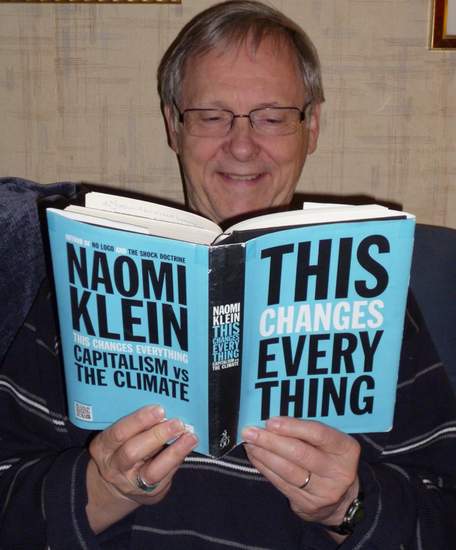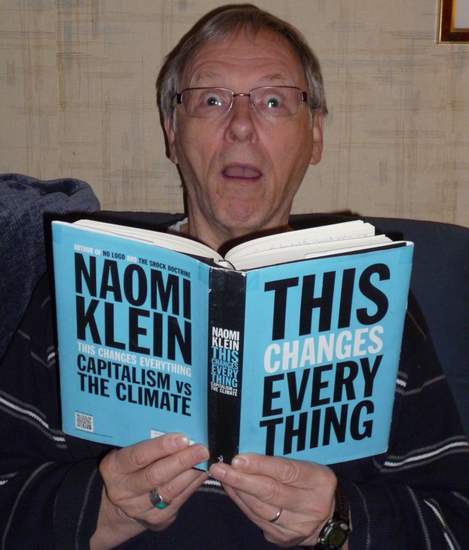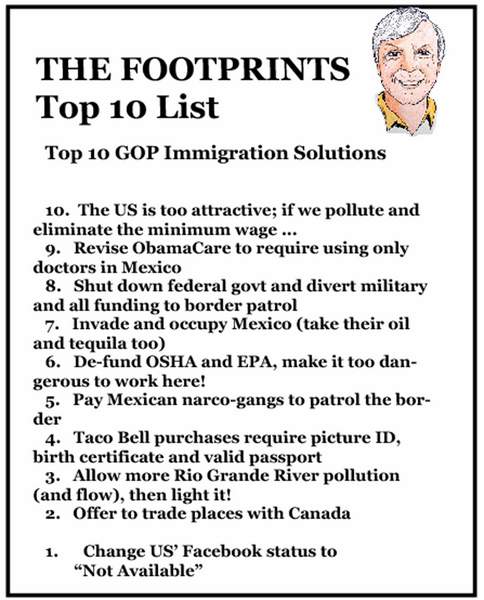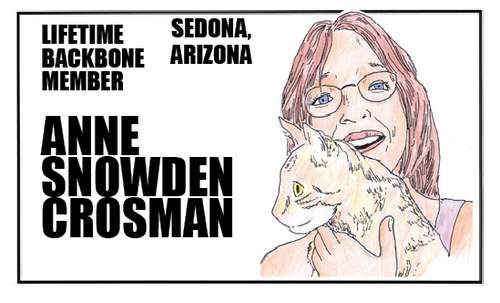“What would be a normal planet would have a lot fewer people and lots more animals, and what we have now is an irregular, abnormal, and dangerous condition.” – Gary Snyder, 2010
In a way this story is painful to write. I like Naomi Klein. She’s a powerful, insightful writer with a deft touch; in addition she’s a superb researcher; a medley of talents you don’t find every day. But when I reached the bottom of page 447 of her new and interesting book on climate change, This Changes Everything – a mere 19 pages before the end – suddenly I felt like I was teleported back to elementary school and she’d smacked the back of my hand with a ruler.
Assembling my wits, I read the two key sentences again with care. And yep, she’d actually said it: “This is a far more expansive  vision than the familiar eco-critique that stressed smallness and shrinking humanity’s impact or ‘footprint.’ That is simply not an option today, not without genocidal implications: we are here, we are many, and we must use our skills to act.”
vision than the familiar eco-critique that stressed smallness and shrinking humanity’s impact or ‘footprint.’ That is simply not an option today, not without genocidal implications: we are here, we are many, and we must use our skills to act.”
“Shrinking humanity’s impact,” of course, is a euphemism for reducing the human population, among other things.
Here is the other reference to genocide that I found in her book. In discussing the specter of geo-engineering, she said this: “…wealthy-country governments are already…allowing temperatures to increase to levels that are a danger to hundreds of millions of people, mostly in the poorest parts of the world, rather than introducing policies that interfere with short-term profits. This is why African delegates at U.N. climate summits have begun using words like ‘genocide’ to describe the collective failure to lower emissions.” (p.276.)
It isn’t surprising that they’re saying that; nor would it be surprising if some dread a nightmare scenario in which authoritarian governments worldwide, controlled by the same kind of selfish elites, insidiously force mass sterilizations upon impoverished people. I do wonder if Klein might be trying to distance herself as much as possible from such fearful scenarios, which would be understandable if she hadn’t in the process typecast a group of people who don’t deserve it. And who have much that is of value to say.
Namely those who are legitimately concerned about overpopulation. They’re not elites at all nor do they have insidious motives; instead they’re caring, reality-oriented, scientifically informed people who have seen the big picture for more than a generation now, and are motivated by compassion.
Let’s spell out what the notorious “shrinking of humanity’s footprint” actually involves: First, that it’s unjust to other species populations for we humans to overpopulate – to exceed the carrying capacity – of any ecosystem, thus placing the other creatures and plants at significant risk of extinction; that we have a fundamental duty to share this world with them. Second, that by overpopulating the planet we impoverish our own lives and those of our descendants as well as the essential genetic biodiversity we depend upon for our own survival. That therefore we need to significantly reduce the collective human footprint and that this is a bottom line for ecological sanity.
It’s a stance to which I’ve been committed for over thirty years. And I’m hardly alone. For example, note the following from Hope on Earth, a book in dialogue form by the renowned scientist Paul Ehrlich and prominent ecologist Michael Charles Tobias, published just this year:
“PE: …the problem now is the extremely high rate of extinction – hundreds of times what prevailed through most of geological history…
…
“MT: …Based on everything I’ve experienced in my life and thought about and observed, if we are, indeed, witnessing the sixth spasm of extinctions in the annals of human biology – in the annals of biology, period, I should say – then is it not incumbent upon us to leave the lightest footprint possible and to advocate for a light impact, rather than the inordinately destructive one that most characterizes our notorious collective, in view of what’s happening all around us?”
“PE: I actually feel very strongly about the inequities represented by at least three billion people on this planet not getting to live the kind of lifestyle I get to live…I’d much prefer a human population of perhaps 1.5 billion, with everyone able to live a lifestyle more like yours and mine. And such a situation should, in the long term, allow more Homo sapiens to live and enjoy life, since we could probably avoid the great collapse of civilization toward which we’re now headed. And it would also allow the rest of nature to persist and continue evolving….” (Hope on Earth, 2014, pp. 89-91.)
I hope these passages demonstrate that raising the issue of human overpopulation is a deeply ethical position and that what matters most to us is preserving the health of ecosystems everywhere, for the ultimate benefit of both humanity and all other beings. The Pulitzer Prize winning poet Gary Snyder expressed this beautifully in the following excerpt from his poem “For All” published in his book Axe Handles in 1983:
I pledge allegiance
I pledge allegiance to the soil
of Turtle Island,
and to the beings who thereon dwell
one ecosystem
in diversity
under the sun
With joyful interpenetration for all.
See, that’s about eco-systemic integrity, and it’s all about inclusion – not exclusion.
And about seeing far into the future.
***
Klein put another observation about overpopulation in her footnote on page 114. Although I thought it was off base when I read it, it didn’t hit me as hard as her later comment about “genocidal implications.” And here it is: after first saying that “…the roughly 500 million richest of us on the planet are responsible for about half of all global emissions,” including the rich in all countries “as well [as] significant parts of the middle classes in North America and Europe,” she added this footnote: “This is why the persistent positing of population control as a solution to climate change is a distraction and moral dead end. As this research makes clear, the most significant cause of rising emissions is not the reproductive behavior of the poor but the consumer behaviors of the rich.”
 What struck me as I read this was that the attention she was giving in her book to the proximate cause of global warming, which is indeed attributable to the fortunate few as she well stated, seemed geared toward justifying massive transfers of wealth as reparations for climate injustice. While at the same time she was discarding the foremost ecological problem on our planet, namely human overpopulation, which the scientific discipline of ecology flatly tells us will make the impacts of climate change immeasurably worse.
What struck me as I read this was that the attention she was giving in her book to the proximate cause of global warming, which is indeed attributable to the fortunate few as she well stated, seemed geared toward justifying massive transfers of wealth as reparations for climate injustice. While at the same time she was discarding the foremost ecological problem on our planet, namely human overpopulation, which the scientific discipline of ecology flatly tells us will make the impacts of climate change immeasurably worse.
In a sense this is getting things backwards, as Paul Ehrlich explains: “…we know from mathematics basically that it will take many decades to make big changes in the size of the population humanely. But of course the experience of World War II also taught me that if we want to change our consumption patterns, we can do it almost instantly…with the right incentives, society can do the right things fast on the consumption side. It can’t do the right thing fast on the population side, which is the reason humanity should have started fifty years ago dealing effectively with the population issue.” (Hope, pp. 151-152.)
Owing especially to the long timetable for meaningful change, overpopulation remains a crucial moral issue, and anything but a “distraction.”
Yet Klein was alert enough, and as usual did enough homework, to point out that even on a heavily populated planet humans can work persistently and intelligently to heal living systems, and that agro-ecological farming can help sustain and protect biodiversity rather than devastate it. And she’s right that important and helpful steps can be taken.(See for example pp. 134-136 on agro-ecology.)
But such efforts will not be enough to protect the existence of other species populations or to sustain humans either. As far as the survival of both is concerned, ignoring the problem of human overpopulation is what has “genocidal implications.”
Even if the mass political and social movement she’s trying to generate is successful and the new society starts out with an abundance of ecological good works, in time the idealistic glow is bound to fade. As the human population continues to grow and grow, reaching eight billion, nine billion, even ten billion or more, by these increasing numbers alone humans will progressively shove ever more species populations off of their existing habitats, thereby sentencing them to extinction.
And it gets worse than this. To have even a chance to survive in the face of climate change, innumerable species populations will need both room to migrate rapidly, that is, connectivity across landscapes, and also new habitats in protected areas if and when they arrive. (See the discussion of protected habitats and connectivity chapters 13 and 14 in Lee Hannah’s Climate Change Biology, 2011). But these creatures and plants won’t have either one because humans, by their ever increasing numbers alone, will progressively sever those connectivities and fill up the needed new habitats.
Thus accelerating the death spiral of extinctions.
The ecological bottom line here is that human-centered, socialist-inspired ideology, as important as aspects of it may be, cannot in the end make up for sheer lack of resources and space, most especially in the face of an ever more unstable and unpredictable climate. What’s likely to be increasing in the long run is not sustainable agricultural production, however carefully planned, but human desperation. Ever more hungry people will in the end seize any and all arable land, no matter where it is or how many species populations they eradicate in the process of clearing and farming it. In the daily struggle for survival appeals for conservation and continued idealism will in the end be greeted with derision and hostility.
Instead of shoving aside the problem of overpopulation, as Klein and so many other climate activists are doing, the best strategy is to face it in a straightforward way, beginning this week (if not sooner). By making it an integral part of the grassroots mass movement addressing climate change, working tirelessly toward reducing the human population through changing the culture while minimizing government mandates and warding off influence from elites. And by carefully establishing and protecting civil liberties in the process, everywhere on the planet.
Together with making state-of-the-art birth control freely available on every street corner and in every hamlet, really, really everywhere. And funded entirely by the wealthiest countries and coupled with equally tenacious advocacy for political, educational, and economic equality for women, throughout every city and in every hamlet.
No bullshit and really, really everywhere.
SCOTT THOMPSON is a regular contributor to the Zephyr.
He lives in Beckley, WV.
To read the PDF version of this article, click here.
To comment, scroll to the bottom of the page.
Don’t forget the Zephyr ads! All links are hot!











Every nitwit this side of Kansas knows that you can’t put 300 monkeys in a shoebox and expect the critters to behave. I ain’t sure what carrying capacity is all about, but free condoms I understand. Copulate, don’t populate!
Stop burning corn in cars. That causes a huge footprint and makes no sense economically.